Related Research Articles
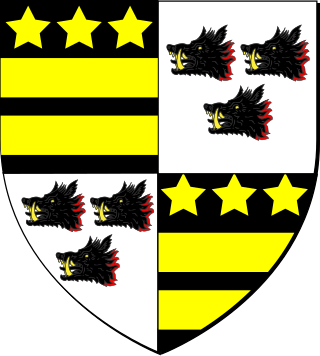
Baron Carbery, of Carbery in the County of Cork, is a title in the Peerage of Ireland. It was created in 1715 for George Evans, with remainder to the heirs male of his father and namesake George Evans, a supporter of William and Mary during the Glorious Revolution, who had earlier declined the offer of a peerage. After his elevation to the peerage, Lord Carbery represented Westbury in the House of Commons. He was succeeded by his eldest son, the second Baron. He also sat as Member of Parliament for Westbury. His grandson, the fourth Baron, briefly represented Rutland in Parliament. He was succeeded by his uncle, the fifth Baron. On his death, the line of the eldest son of the first Baron failed. He was succeeded by his first cousin once removed, the sixth Baron, who had previously succeeded his father as second Baronet, of Castle Freke. Lord Carbery sat in the House of Lords as an Irish representative peer from 1824 to 1845. His nephew, the eighth Baron, was an Irish Representative Peer from 1891 to 1894. As of 2014 the titles are held by the latter's great-great-grandson, the twelfth Baron, who succeeded his father in 2012.
Christopher Jeremy Sandford was an English television screenwriter who came to prominence in 1966 with Cathy Come Home, his controversial entry in BBC1's The Wednesday Play anthology strand, which was directed by Ken Loach. Later, in 1971, he wrote another successful one-off, Edna, the Inebriate Woman, for The Wednesday Play's successor series Play for Today.
Christopher Sandford (1902–1983) of Eye Manor, Herefordshire, was a book designer, proprietor of the Golden Cockerel Press, a founding director of the Folio Society, and husband of the wood engraver and pioneer Corn dolly revivalist, Lettice Sandford, née Mackintosh Rate. During the war he organised preparations for underground resistance from Eye Manor in the event of a Nazi invasion.
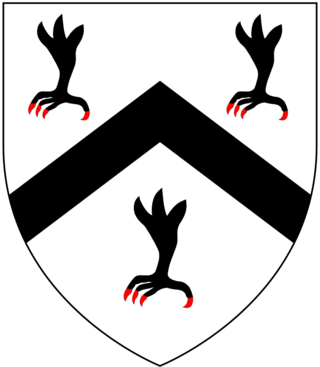
Edmund Braye, 1st Baron Braye, of Eaton Bray in Bedfordshire, was an English peer.
George Evans, 1st Baron Carbery PC (Ire) was an Anglo-Irish politician and peer. A member of a County Limerick family of Whigs, he entered the Irish House of Commons and was created a peer in 1715 as a reward for his father's support of the Hanoverian succession, after his father declined the offer. At the same time, he was returned to the British House of Commons for Westbury. He contested control of the borough with the Tories led by the Earl of Abingdon until 1727, when he stood down.
Carbery or Carbury may refer to:
Percy Brodrick Bernard was an Irish Conservative Party politician who sat briefly in the House of Commons in 1880.
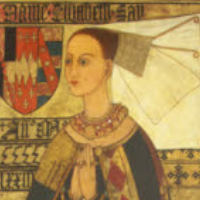
Elizabeth Cheney was a member of the English gentry, who was the great-grandmother of Anne Boleyn, Jane Seymour, and Catherine Howard, three of the wives of King Henry VIII of England, thus making her great-great-grandmother to King Edward VI, the son of Henry VIII and Jane Seymour, and Elizabeth I, the daughter of Henry VIII and Anne Boleyn. Her first husband was Sir Frederick Tilney, and her second husband was Sir John Say, Speaker of the House of Commons. She bore a total of eight children from both marriages.

The MacCarthy Reagh dynasty are a branch of the MacCarthy dynasty, Kings of Desmond, deriving from the Eóganacht Chaisil sept.
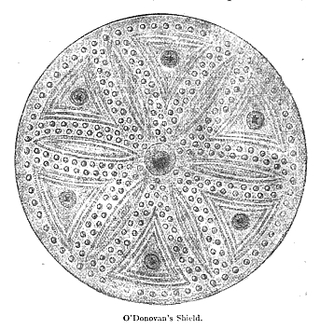
Donal II O'Donovan, The O'Donovan of Clann Cathail, Lord of Clancahill, was the son of Ellen O'Leary, daughter of O'Leary of Carrignacurra, and Donal of the Skins, The O'Donovan of Clann Cathail. He is most commonly referred to as Donnell O'Donevane of Castledonovan in contemporary references of his time.

Carbery, or the Barony of Carbery, was once the largest barony in Ireland, and essentially a small, semi-independent kingdom on the southwestern coast of Munster, in what is now County Cork, from its founding in the 1230s by Donal Gott MacCarthy to its gradual decline in the late 16th and early 17th centuries. His descendants, the MacCarthy Reagh dynasty, were its ruling family. The kingdom officially ended in 1606 when Donal of the Pipes, 17th Prince of Carbery chose to surrender his territories to the Crown of England; but his descendants maintained their position in Carbery until the Cromwellian confiscations, following their participation in the Irish Rebellion of 1641 after which some emigrated to the Chesapeake Colonies.
Cormac na Haoine MacCarthy Reagh, 13th Prince of Carbery was an Irish chieftain who owned almost half a million acres in south west Ireland.
Peter Ralfe Harrington Evans-Freke, 11th Baron Carbery was the 11th Baron Carbery and owner of Castle Freke from 1970 until his death at the age of 92 in 2012.
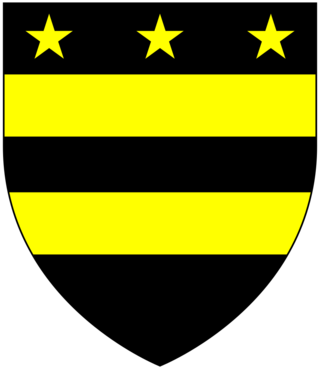
Sir Ralph Freke, 1st Baronet of West Bilney, Norfolk, and Rathbarry, County Cork, was a baronet in the Baronetage of Great Britain and a Member of Parliament in the Irish House of Commons.

Sir John Redmond Freke, 3rd Baronet was a baronet in the Baronetage of Great Britain and a member of parliament in the Irish House of Commons.

Katherine Fitzgerald (c.1452-1506) was an Anglo-Irish noblewoman of the Geraldine's dynasty during the 15th century. At the time of her birth, her family was one of the most influential houses in Ireland. By her husband, her married name was Mac Carthaigh Riabhach and she became the princess of Carbery from 1477 to 1506.
Elizabeth Freke (1641–1714) was an English memoirist and poet, known for her diaries and remembrances, but also for a collection of recipes covering medicine and cooking. Her poetry includes a dramatic dialogue between Eve and the Serpent of Eden.

Castlefreke, also known as Rathbarry, is a townland and village in County Cork, Ireland. The townland is located in the civil parish of Rathbarry on the R598 regional road, to the east of Rosscarbery.

Sir Charles MacCarthy, 1st Viscount of Muskerry, also called Cormac Oge, especially in Irish, was from a family of Irish chieftains who were the Lords of Muskerry, related to the Old English through maternal lines. He became the 17th Lord of Muskerry upon his father's death in 1616. He acquired a noble title under English law, becoming 1st Viscount Muskerry and 1st Baron Blarney under letters patent. He sat in the House of Lords in both Irish parliaments of King Charles I. He opposed Strafford, the king's viceroy in Ireland, and in 1641 contributed to his demise by submitting grievances to the king in London. Muskerry died during this mission and was buried in Westminster Abbey.
Donal MacCarthy Reagh of Kilbrittain was an Irish magnate who owned the extensive lands of Carbery in south-western County Cork.
References
- ↑ http://www.tolliss.com/gedview/individual.php?pid=I2167&ged=Tolliss.ged%5B%5D
- ↑ "Mary Carbery's West Cork Journal (EBook): 9781843513025". Archived from the original on 4 March 2016. Retrieved 19 September 2014.
- Carbery, Mary, Happy World, the story of a Victorian childhood, Longmans Green, London, 1942.
- Carbery, Mary, Mary Carbery's West Cork Journals, 1898-1901: Or from the Back of Beyond, ed Jeremy Sandford, Lilliput Press, 1998.
- Wilson, Denis, De Iron Trote the Cork Eye Ear and Throat Hospital 1868-1988, Eglantine, Cork, 1989.